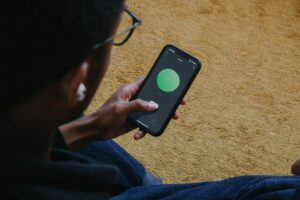Does the thought of managing your money make your head spin? Mine too, for a long time. For years, I avoided looking at my bank statements or even thinking about where my money went. It felt overwhelming, like another thing I was failing at. But I’ve learned that just like overcoming other tough habits, simplifying my financial tracking changed everything. It’s not about perfection; it’s about consistent small steps.
I used to think tracking my money meant endless spreadsheets and complicated systems. The truth is, it doesn't have to be. I found that the same principles that helped me lose over 110 pounds—breaking big goals into small, actionable steps and celebrating tiny wins—also worked wonders for my finances. It’s about building a sustainable habit, not a rigid prison.
Here are 10 simple tips I use to keep my finances clear and on track.
Start Small. Track for a Week.
Don't dive headfirst into a year-long budget. Just track every single dollar you spend and receive for one week. Write it down, use an app, whatever works. This isn't about judging your spending. It’s simply about seeing where your money goes. I remember doing this for the first time; it was eye-opening to see how many small purchases added up. This little step builds awareness without the pressure.
Pick One Simple Method
You don’t need a fancy system. A simple notebook, a basic spreadsheet, or a free budgeting app works great. The key is consistency. I personally use a simple spreadsheet because I like seeing everything laid out. What matters most is choosing something you’ll actually use regularly. Don't overthink it. Just pick one and start.
Know Your "Why"
Why do you want to track your money? Is it to save for a trip, pay off debt, or just feel less stressed? When my faith deepened, I understood that good stewardship means taking care of the resources God gives us. This perspective shifted my "why" from simply personal gain to a greater purpose. Knowing your reason keeps you motivated when things get tough. Write your "why" down and keep it somewhere visible.
Set Realistic, Small Goals
Just like I didn't try to lose 110 pounds overnight, you won't fix your finances in a day. Set small, achievable goals. Maybe it's "track spending for 3 days this week," or "save $20 more this month." These small wins build momentum and keep you going. Celebrating these small victories makes the journey enjoyable, not a chore.
Automate Your Savings
This is a game-changer. Set up an automatic transfer from your checking account to your savings account right after payday. Even if it's just $25 or $50, it adds up. You won't even miss the money because you never see it. This one trick saved me so much hassle and helped me build an emergency fund without really trying.
Review Regularly, Not Constantly
You don't need to check your finances every day. Pick a consistent time: once a week, or once a month. I review mine every Sunday evening. This lets me see where I stand, adjust if needed, and plan for the week ahead. It keeps me informed without feeling obsessive. This routine helps me stay accountable, just like my daily gratitude practice helps me stay grounded.
Distinguish Needs from Wants
This is a tough one, but crucial. Before you buy something, ask yourself: Is this a need or a want? Be honest. Needs are essentials like housing, food, and transportation. Wants are everything else. It’s okay to have wants, but understanding the difference helps you make intentional choices. This simple question stops many impulse purchases.
Create a Simple Budget Category System
You don't need dozens of categories. Start with a few broad ones: Housing, Food, Transportation, Bills, Savings, and Fun. As you get comfortable, you can add more detail. The goal is clarity, not complexity. Keeping it simple means you’re more likely to stick with it.
Build a Buffer
Try to keep a small buffer in your checking account. This is extra money beyond what you need for bills. It smooths out unexpected expenses and stops you from dipping into savings for small things. Even $100 or $200 can make a huge difference in reducing stress. It’s like having a little financial safety net.
Find Accountability (with a trusted friend)
Share your financial goals with a trusted friend or family member. This isn't about asking them for money or judging your choices. It's about having someone to talk to, celebrate wins with, and who can gently remind you of your goals. Just like having a workout partner, it keeps you motivated and honest. I've found sharing my goals with my close community helps me stay focused and purposeful.
Taking control of your finances doesn't need to be scary or complicated. It's about consistent, small actions that build over time. Just like any other habit I've changed—whether it was letting go of gaming or building a productive work routine—the secret lies in starting small and being kind to yourself along the way.
What's one tiny step you can take today to make your financial tracking simpler? Don't wait for the perfect moment. Just start.





